Following on from the previous post on how to sing about the wrath of God, here are some simple diagrams to explain the hermeneutics involved.
1. There is a tension between two understandings of the cross. The rigorous conservative/Reformed folk want to sing about the wrath of God being satisfied. More liberal/squeamish evangelicals (like me) would much prefer to sing about the love of God being magnified.

2. Roger Olson proposed a theological resolution of the tension based on Kazoh Kitamori’s book, Theology of the Pain of God. “Wrath of God must be interpreted as the expression of God’s love when it is betrayed and rejected.” Theology tends to operate with universals and abstractions.
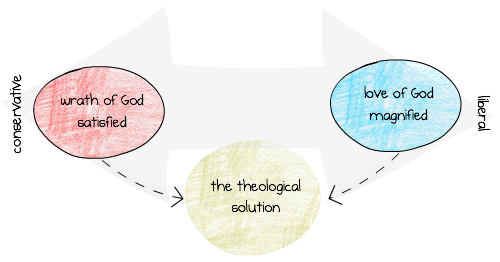
3. I set out an alternative narrative-historical explanation of “wrath of God” language as a way of talking about what Israel’s God was doing in and through and for his people—and for the sake of his own reputation—in the period covered by the New Testament, roughly the first three centuries of the Christian era. The tension between wrath and love is resolved not at the abstract level but in the historical experience of the community.
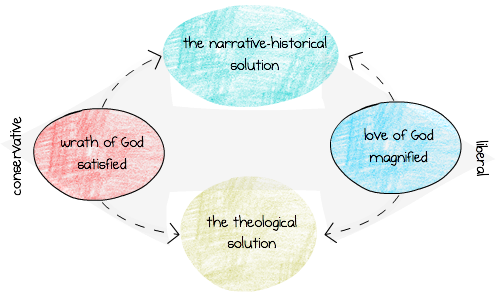
4. The hermeneutical problem is the gap between our theologies and the narrative-historical interpretation of the New Testament. It’s much too big. It gives us a headache.
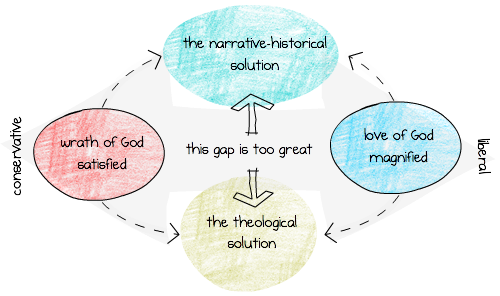
5. A lot of current evangelical thought leaves the gap in place but tries to fill it with messy compromises that do little more than allegorize the biblical narrative to make it support the mainstream evangelical position. There always has to be a sensus plenior in some form. Jesus was speaking both about the imminent destruction of Jerusalem and about the non-imminent final judgment. Both at the same time. Without actually saying so. Hopefully that will keep everybody happy.
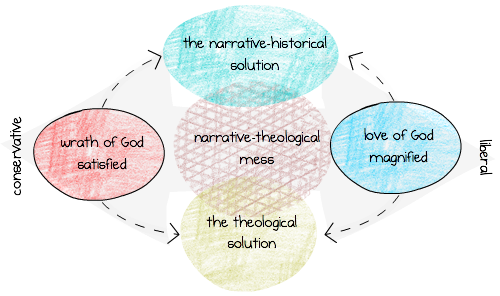
6. I think the better solution is to bring theology and history much closer together—as close as we can get them—not by forcing scripture to conform to our theology but by getting theology to rethink itself through careful dialogue with scripture.
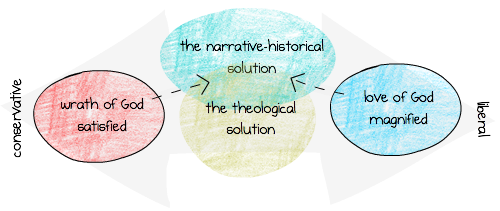
Sorry Andrew, don’t mean to be trite but reading this reminds me of a favorite Robin Williams/Adrian Cronauer quote from ‘Good Morning Vietnam!’ :
Dickerson: … You’re not gonna last long here, pal.
Adrian: You can always send me back to Crete.
Dickerson: Oh, you think this is a joke! I can come up with alternatives other than Crete- I’m real good at stuff like that. I got people stuck in places they haven’t even considered how to get out of yet. You don’t think I can come up with somethin’ good? Can you envision some fairly unattractive alternatives?
Adrian: Not without slides.
Just saying …
@Richard Heald:
Right, you mean…?

@Andrew Perriman:
As in slippery slope?
@Jim Robertson:
Maybe, but everyone’s having such fun!
Doesn’t the problem that Roger Olson identifies remain? Even with a smaller story of Jesus and the cross (though the “wrath of God” is never mentioned on this level), there would be an issue with a God who demonstrates his wrath by pouring it onto Jesus in order to let those who believe in him off the hook. A worse issue, because he takes it out on an innocent human proxy — human sacrifice of the worst kind.
I don’t see how a smaller story of Jesus and the cross (if I can put your interpretation that way) avoids an inevitable theological issue: what kind of God is God?
Having just ploughed my way through Parts 1 & 2, I wonder if you have read N.T. Wright’s Paul & the Faithfulness of God, and what you make of it? A major issue for consideration might be his treatment of narrative, and the distinction between poetic (surface) narrative, and referential (less explicit) narrative. Wright makes a pitch for the latter in Paul; if he’s right, it would also apply to the gospels. Your comment: “Jesus was speaking both about the imminent destruction of Jerusalem and about the non-imminent final judgment. Both at the same time. Without actually saying so.” though amusing, would be somewhat simplistic.
Wright makes a pitch for three interlocking narratives in Paul, each dependent on the other, and without any one or two of which Paul doesn’t make sense. It gives you a headache to follow it, but it’s quite convincing once you’ve got the hang of it.
@peter:
Habakkuk offers one perspective on the “problem”, if it is a problem, of Jesus suffering the wrath of God. God judges unrighteous Israel by means of the Babylonians. Death and destruction. But what will happen to the righteous who do not deserve to be punished? They will live by virtue of their faith(fulness) (Hab. 2:4). It is a model for Jesus’ suffering, and Paul will take it as a model for the suffering of the churches which will have to live through the tribulation that will accompany the subsequent wrath of God against the pagan world.
@Andrew Perriman:
Doesn’t the insistence on abstraction cause most of the issues? If wrath is historical and national first and foremost then there is no “wrath of God” in a universal existential sense. In this perspective Jesus’ death is part of the out working of the specific wrath against the people of Israel and Jesus faces that wrath, within the Son of Man motif, willingly not because God required it as part of a theological equation but as a way to rescue his people from destruction. As a representative of his people Jesus shows the way through the wrath and destruction into the age to come. His faithfulness makes the continuation of the people of God possible and his being raised from the dead and seated at the right hand of God positions him then as judge of the pagan world.
It is the insistence on abstract universal propositions and theories that require the headaches. Or have I over simplified things?
That’s my argument in a nutshell, except perhaps to add that there is a “baseline” judgment on all human sin, which is death—though even then we should recognize that this is a distinctly Pauline perspective. But that is not what the language of wrath refers to.
@Andrew Perriman:
What about Jesus’s substitutionary penal atonement (eg Romans 8:3-4)? That’s where the problem arises, not in the example (or promise) of his martyrdom.
I’m still interested to know what you make of Paul & the Faithfulness of God, especially Parts 1 & 2, which is as far as I’ve got. It does bear on the whole narrative question, which is the referential question underlying much of these discussions.
@peter:
But whose problem is it? Mine? Yours? Getty and Townend’s?
I’ll have a look at Wright sometime.
@Andrew Perriman:
But whose problem is it? Mine? Yours? Getty and Townend’s?
Probably yours; not mine at all. Can’t speak for Getty and Townend.
In the previous post, you alluded to an atonement of Jesus, and described it in this way:
As an act of atonement Jesus’ death on the cross saved part of Israel from the wrath of God understood in just these historical terms.
The historical terms were that Jesus opened up a “narrow way of suffering” for his followers (to weather the storm of God’s wrath, or the storm of persecution from Jews and Romans?).
But this is confusing two terms. There is the martyr’s example Jesus set by his death on the cross, but there is also his death on the cross as an atonement — Romans 8:3.
The problem remains in both accounts — yours as well as the theologian song-writers: how to resolve the tension between love and wrath in the atonement? The problem is greater in your account, since Jesus is an innocent proxy, facing a God who demands a human sacrifice in which sin can be condemned in the flesh — Romans 8:3.
This problem is actually resolved in all the traditional accounts of the cross, in which God bore the suffering in Himself. In this sense, wrath isn’t quite the right word to use of what Jesus bore on the cross, and isn’t used in the bible. But it gets the point across in the song, more or less.
The problem is also resolved for those who recoil at the idea of the cross as ‘cosmic child abuse’. It simply isn’t anything like child abuse if God is suffering himself for sin.
This is a cure for headaches of every conceivable theological variety, and the deepest insight we have into the character of God.
I’m still interested in your response to Wright’s P.A.T.F.O.G., when you have a spare moment.
@peter:
But this is confusing two terms. There is the martyr’s example Jesus set by his death on the cross, but there is also his death on the cross as an atonement - Romans 8:3.
I don’t see the problem. Why shouldn’t the “pioneering” death of a righteous martyr be viewed or redescribed as an act of atonement? 4 Maccabees describes the death of the martyrs under Antiochus in these terms:
The tyrant himself and all his council marveled at their endurance, for which they now stand before the divine throne and live the life of the blessed age. For Moses says, “All the sanctified ones are under your hands.” And these who have been divinely sanctified are honored not only with this honor, but also in that, thanks to them, our enemies did not prevail over our nation; the tyrant was punished, and the homeland was purified, since they became, as it were, a ransom for the sin of the nation. And through the blood of those pious people and the propitiatory of their death, divine Providence preserved Israel, though before it had been afflicted. (4 Macc. 17:17–22)
They were righteous, their deaths were an atonement (hilastērion) for the sin of the nation, they were raised as reward and vindication, they saved Israel from defeat, the wrath of God against Israel was satisfied, and they set an example, even for Antiochus own troops (17:23-24). The old man Eleazar both wishes to “leave to the young a noble example of how to die a good death willingly and nobly for the revered and holy laws” (2 Macc. 6:28) and prays that God will be “satisfied with our punishment” on behalf of sinful Israel: “Make my blood their purification, and take my life in exchange for theirs” (4 Macc. 6:28-29).
That seems to me precisely to anticipate much of what the New Testament says about Jesus.
This problem is actually resolved in all the traditional accounts of the cross, in which God bore the suffering in Himself.
We’ve had this argument before. Which “traditional accounts” do you have in mind? Apart from the fact that patripassianism was condemned by the church, there is not a scrap of evidence in the New Testament to support the view that God suffered on the cross.
The wikipedia article, for what it’s worth, accommodates patripassianism with the crucifixion only in the sense that the Father suffered the emotional pain of separation from the Son:
With regard to the crucifixion of Jesus, it is consistent with Scriptural teaching to say that God the Father “suffered”—that is, felt emotional/spiritual pain—along with His Son. This was due to the temporary breach of their relationship when the Son took upon himself the wrath of the Father toward sin. Jesus expressed this temporal divine rift when he cried out, “My God, my God, why have you forsaken me?” (Matthew 27:46)
@Andrew Perriman:
We’ve had this argument before. Which “traditional accounts” do you have in mind? Apart from the fact that patripassianism was condemned by the church, there is not a scrap of evidence in the New Testament to support the view that God suffered on the cross.
I’m actually slightly bemused that you can say this, Andrew. I wonder if you have ever really been exposed to traditional teaching of any kind before you started developing your current views.
The traditional trinitarian interpretation of the New Testament means that Father, Son Spirit are one, not separate beings more or less independently doing their own thing. When Jesus died on the cross, the Father suffered with the Son: if not by experiencing the suffering of the Son with him (which seems obvious to me), but certainly by experiencing a tearing apart from the Son in his sin-identification.
I realise that you don’t believe this, but it’s what all sections of the Christian community believe, and labelling it with an obscure early heresy doesn’t alter the fact. Trinitarianism makes the assumption of the Father’s suffering with the Son an inevitable theological conclusion — but with the caveat I have mentioned.
At some point you will need to address the problems to which your hermeneutic leads you, one of the greatest of which is presenting God as a monster requiring innocent human sacrifice of the most brutal of kinds. He didn’t, since He himself provided a sacrifice which no human person was qualified to make.
4 Maccabees provides at best a highly imperfect interpretation for the martyrdom of Jesus, and it’s little wonder that it is not included as an authoritative part of any canon, apart from (according to the authoritative nearly infallible Wikipedia) the Georgian bible. Just because something was written in an ancient text doesn’t make it a universally accepted belief then or now.
@peter:
But you have given no biblical basis for the view. It’s one thing to say on theoretical trinitarian grounds that “God the Son” suffered on the cross. But that is not what the New Testament means when it says that the “Son of God” suffered on the cross, which is what the post is about. The biblical argument presupposes no identification of the Son with the Father. Quite the opposite. I can’t even think of a text that would suggest that the Father suffered on account of the Son’s sufferings—in the way that Abraham might have suffered as a father if he had actually killed Isaac—though that might be a reasonable thing to expect.
@Andrew Perriman:
The thread which follows this (Richard Hays and the God who walks …) sets out the biblical arguments for a divine sonship very well. It’s increasingly odd to me that you seek biblical justification for denying a divine sonship, whilst actually resting your case mainly on the same grounds which you energetically use to dismiss it. The grounds you are using to prove an exclusively human sonship of Jesus all rest on inference, not biblical texts. The grounds depend on the inference that Jesus was appointed by YHWH as an exclusively human delegate. Since this divine appointment appears nowhere in any of the gospels, it is just as open to criticism as the argument for a divine sonship.
Even in Daniel, which you make so much of, there is no appointment of an exclusively human delegate. The one “like a son of man” in 7:13, appears to be given God-like characteristics in 7:14 (the passage is full of ambiguities, eg singular/corporate, human/divine). The divine characteristics of a singular person in 7:14 are then echoed in the almost identical words which are used of the Most High in 7:27b. All these ambiguities are arrestingly resolved if we take Jesus as the human/divine son. A God incarnate theology now makes better sense of Daniel than any other interpretation. There’s a biblical basis for you.
The argument for an exclusively human sonship unravels with the cumulative effect of the texts which appear in Hays’s supporting evidence (and I’ve pointed out these texts before on this website). It’s not just once that Jesus is described in terms that echo an exclusively YHWHist text from the OT, but repeatedly — a phenomeon you completely overlook in the Hays criticism. Then there is the even larger looming question as to Jesus’s identity — and this isn’t as simple as the question about whether he was Israel’s messiah or not. It is the question of what kind of person he was. This is precisely the larger question which the gospels themselves repeatedly ask. You haven’t begun to answer that question, and not surprisingly, because it runs contrary to your argument.
Finally there is the question about what kind of God Jesus was representing. Yours is a monster who requires human sacrifice. But this runs directly counter to two thousand years of YHWH’s interaction with his people, starting with Abraham and the aborted sacrifice of Isaac, and continuing through the levitical sacrifices, which ran counter to the practices of surrounding nations which regularly required human/child sacrifices. These were an abomination to Israel’s God. So it’s unlikely in the extreme that YHWH should execute a u-turn and require a human sacrifice in the form of Jesus.
So what alternative are we left with? It is the unexpected, but only remaining possibility. Jesus was more than mere man, but God incarnate, and in dying on the cross. was demonstrating to its depths the self-sacrificial nature of God. This is entirely grounded in a biblical basis. It is also such an ethically superior position to believe in than yours, that if it came to tossing a coin as to which to adopt (which in the end is what all the nit-picking amounts to), there’s no question as to which to choose.
Was there no anticipation of this in the OT? From the start, perfect humanity was in the godhead — “in the image of God he created him (man); man and woman he created them” — Genesis 1:27. Jesus was bringing the true image of man as well as God to light, and restoring that broken image in broken man.
Now, follow this line of thought throughout the OT, Daniel, and 7:13 in particular as the restoration of “true man” (it’s not a ‘novelty’, so Sinclair B. Ferguson, New Bible Commentary). Then in the NT, Jesus as the new Adam — Romans 5:12-21; 1 Corinthians 15:22; 1 Corinthians 15:45-49.
This is the template for understanding the gospels, or rather the template of the gospels which interprets the rest of the NT, by addressing the question which you have not begun to ask, and which the gospels ask repeatedly: What kind of person was Jesus?
So there are plenty of biblically textual grounds for seeing Jesus as the divine son who came to restore the broken image of man, to restore true humanity. That is what he does on every page of the gospels, which you seem unable to see.
If he was the divine son, in unique relationship with the divine Father (the uniqueness of which you conspicuously overlook), what does that tell us of his suffering on the cross? What does that tell us of the suffering of the Father, even if there is no proof text to spell out the blindingly obvious?
I admire the rigour which you apply to textual exegesis, but exegesis depends on more than an accumulation of proof texts. Sometimes, it seems to me that criticisms such as “you give no biblical basis for the view” (which I hope is now shown very clearly to be untrue), amounts to an exegesis which strains out gnats but swallows camels. “No biblical basis for the view?” I sometimes think that you haven’t even begun.
@peter:
The burden of proof surely lies with those who wish to show that the language of sonship in the Synoptic Gospels signifies divine identity. Jesus is patently a human figure in the stories. He is said to be a son or “son of God”. The conceptual background to the sonship saying at Jesus’ baptism is found in the Old Testament, where it refers, as I noted in the Richard Hays post, perhaps to the victim Isaac, or to the servant Israel, or to the king who is given authority to rule over his enemies. Similarly, the temptation narrative casts him as the “son of God” who is obedient Israel, succeeding where ancient Israel had failed. The idea that he experiences these things, does these things, as YHWH is simply not there.
This seems to me to be a matter of sound exegetical method. It does not rest on “the inference that Jesus was appointed by YHWH as an exclusively human delegate”. The appointment motif is not particularly relevant for the Gospels—indeed, I didn’t make reference to it, you introduced the idea. It belongs after the resurrection (cf. Acts 2:36; Rom. 1:4). But we do have in the Synoptic Gospels the idea that Jesus has been given authority by God to act on his behalf. That is the only explanation given in the text for his absolution of the paralytic’s sins. Elsewhere we have, for example: “all things have been handed over to me by my Father” (Lk. 10:22); and “I assign to you, as my Father assigned to me, a kingdom” (Lk. 22:29).
The most important statement that Jesus makes about his own identity, in response to Caiaphas’ question whether he is the “son of the Blessed”, is this:
I am, and you will see the Son of Man seated at the right hand of Power, and coming with the clouds of heaven. (Mk. 14:62)
He identifies himself with Daniel’s figure “like a son of man” and with the king who has been made to sit at the right hand of God. There is no confusion of the human and divine in Daniel’s vision. The Ancient of Days judges the four beastly kingdoms and then gives dominion to a fifth kingdom represented by the son of man figure—the people of the saints of the Most High. The son of man is no more to be confused with YHWH than the stone which destroys the statue in Daniel 2. The stone is a kingdom set up by the God of heaven (Dan. 2:44). The point of Daniel 7:27 is that this new people rules the world on God’s behalf:
Ruling God’s world on God’s behalf, the humanlike figure fulfills the role once given to humanity as a whole at creation (Gen 1–2) and later bestowed on the king of Israel in particular (e.g., Ps 2). (J.E. Goldingay, Daniel (WBC, 1989), 190)
There is no “God incarnate theology” here. It is a kingdom theology. God gives authority to the persecuted saints—or to his king—to rule over the nations on his behalf.
I’m not going to deal with the accusation that this God is a monster who requires human sacrifice. I haven’t said that. But I do agree with Isaiah’s interpretation of the suffering of God’s servant:
Surely he has borne our griefs and carried our sorrows; yet we esteemed him stricken, smitten by God, and afflicted. But he was pierced for our transgressions; he was crushed for our iniquities; upon him was the chastisement that brought us peace, and with his wounds we are healed. All we like sheep have gone astray; we have turned—every one—to his own way; and the LORD has laid on him the iniquity of us all…. Yet it was the will of the LORD to crush him; he has put him to grief; when his soul makes an offering for guilt, he shall see his offspring; he shall prolong his days; the will of the LORD shall prosper in his hand. (Is. 53:4–6, 10)
@Andrew Perriman:
Actually Andrew, the authority given to Jesus to forgive sins, cleanse the unclean, reinterpret the sabbath, speak of himself as if he were YHWH, challenge food laws, receive reverence rather than direct it to YHWH does strongly require, if he were the exclusively human delegate that you say he is, an occasion in which the authority is delegated to him by YHWH. That never happens, not even at his baptism, which would have been the most obviously appropriate occasion. All your interpretation of Jesus as “delegate” founders because of this absence. It is based on an inference which the story itself increasingly calls into question.
This raises the most important question of all, which you don’t get round to asking: what kind of person was Jesus? He was very unlike any other Old Testament character with whom he might be compared, especially in that there were no character flaws which all the OT predecessors glaringly exhibited. To say he was Israel’s messiah, the one to whom authority had been given according to Daniel’s prophecy, simply avoids the question. He was in many ways unique. How did that uniqueness cohere in him? What did it make him?
You repeat something that is manifestly untrue:
But we do have in the Synoptic Gospels the idea that Jesus has been given authority by God to act on his behalf. That is the only explanation given in the text for his absolution of the paralytic’s sins.
There was no precedent for forgiveness of sins by any human agent. The scribes, teachers of the law, knew this more than anyone. “Who can forgive sins but God alone?”. Jesus demonstrated that he could by healing the paralytic. What does this tell us about who Jesus was? (a) He was a human agent — but there has been no point at which this authority (or authority to do any of the other things which required diving authorisation) had been conferred upon him by YHWH, a glaring omission which undermines the ‘human agent’ interpretation. (b) He was God in human form.
The authors of the four gospels believed that Jesus was man and God, (a) because that was the view of the church at the time the gospels were written (and remains so to this day), and more importantly (b) the man/God view of Jesus is written into the gospels, for which Richard Hays gives adequate evidence, even if it is not evidence which he has uniquely discovered. I would add (c) that the gospels are also skilfully written literature, in which the divinity of Jesus, more fully apparent in the events following that stage of the story, is written into the story through carefully laid clues by each author/narrator.
A much more important issue arises with Jesus’s forgiveness of sins however, which can be overlooked in this sort of discussion. Forgiveness of sins was precisely what was lacking in Israel’s covenant status with God at that time. If Jesus was forgiving sins, it meant that covenant renewal was taking place, the exile was over, the promises were being realised. The shocking fact was that this forgiveness of sins was coming to those who were not supposed to be receiving it, and by-passing those who expected to received it first.
That the Jesus who personally conferred forgiveness of sins (and all the other things he did for which no divine authority was given to him, apparently) was human/divine makes sense and is in line with the rest of the story before and since, which is why the interpretation is a commonplace — eg “more than mere man” — Alan Cole New Bible Commentary; “to help such men make the staggering equation between the man Jesus Christ and the Godhead, the Lord gave an unmasked sign of divine power” — Alan Cole again, Tyndale New Testament Commentaries. I don’t collect commentaries, but this gives the gist of one commentator’s opinion in two different, widely read and respected commentaries. I’m sure there are many more.
You haven’t addressed the issues I raised in Daniel 7. The issue of the identity of Jesus in the gospels is also not limited to whether he was identified with the son of man figure from Daniel. Also, to put it straightforwardly, it is not a kingdom theology instead of a God incarnate theology in Daniel 7; it is both.
I’m not going to deal with the accusation that this God is a monster who requires human sacrifice. I haven’t said that.
Of course you haven’t said it. But that is where your interpretation is taking you. An unintended consequence, but consequence nevertheless. That’s why I said: “At some point you will need to address the problems to which your hermeneutic leads you, one of the greatest of which is presenting God as a monster requiring innocent human sacrifice of the most brutal of kinds”. It’s not the only unintended consequence, but it is the one which relates most directly to the topic of this thread.
We agree on one thing though: we both believe in Isaiah 53:4-6,10, which I assume you take to refer to Jesus as the person in whom it finds its fulfilment. Your italicisation of words and phrases proves nothing to the contrary of what I would believe, which is that when the prophecy was fulfilled in Jesus, it was fulfilled in him as the divine Son of the divine Father. This is the implication of the whole story as filled out by gospels and letters in the New Testament, and it has to be said, is what mainline Christian churches of all varieties all over the world believe, and have always believed, overcoming significant challenges to that belief in history. One has to ask why this has been the case. It would take an extraordinary process, and extraordinary people, to reverse this situation. I don’t think that will ever happen, because it is scripturally corroborated, and power accompanies the belief, which in the end is what people are looking for: to transform their lives, their worlds, and their everyday situations. “The kingdom of God is not a matter of talk but of power” — and that holds true for all kinds of situations beyond the immediate context of church discipline.
@peter:
Peter, most of this I will not attempt to reply to. It is a mass of unsubstantiated generalizations, and it deals with none of the specific points of interpretation that I have made in response to your previous comments, including a paragraph on Daniel 7—the figure in Daniel 7:14 is not given God-like characteristics, he is given a kingdom, that’s all. I will, however, pick up on one matter:
…the authority given to Jesus to forgive sins, cleanse the unclean, reinterpret the sabbath, speak of himself as if he were YHWH, challenge food laws, receive reverence rather than direct it to YHWH does strongly require, if he were the exclusively human delegate that you say he is, an occasion in which the authority is delegated to him by YHWH. That never happens, not even at his baptism, which would have been the most obviously appropriate occasion.
I assume that when Jesus receives the Spirit and a voice is heard from heaven saying, “You are my beloved Son; with you I am well pleased” (Mk. 1:11), there is a reference to, perhaps among other texts, Isaiah 42:1-4:
Behold my servant, whom I uphold, my chosen, in whom my soul delights; I have put my Spirit upon him; he will bring forth justice to the nations. He will not cry aloud or lift up his voice, or make it heard in the street; a bruised reed he will not break, and a faintly burning wick he will not quench; he will faithfully bring forth justice. He will not grow faint or be discouraged till he has established justice in the earth; and the coastlands wait for his law.
This suggests to me that Jesus’ baptism is indeed the moment when he is anointed with the Spirit, commissioned, given authority by God to act on his behalf in order to fulfil God’s purposes with respect to Israel and the nations. Isaiah calls in 40:3 for a preparation of the way of YHWH, but YHWH’s work is done through the agency of an anointed servant. This is exactly Mark’s argument in this opening chapter.
If you object that this doesn’t specify the forgiveness of sins, we may include the command to Isaiah to tell Jerusalem that “her iniquity is pardoned”—Isaiah the prophet is given authority to tell Israel that her sins are forgiven.
And there is also Isaiah 61:1-2, where the Jubilee reference presumably carries the idea of a forgiveness of sins following judgment:
The Spirit of the Lord GOD is upon me, because the LORD has anointed me to bring good news to the poor; he has sent me to bind up the brokenhearted, to proclaim liberty to the captives, and the opening of the prison to those who are bound; to proclaim the year of the LORD’s favor, and the day of vengeance of our God; to comfort all who mourn…. (Is. 61:1–2)
@peter:
The traditional trinitarian interpretation of the New Testament means that Father, Son Spirit are one, not separate beings more or less independently doing their own thing. When Jesus died on the cross, the Father suffered with the Son: if not by experiencing the suffering of the Son with him (which seems obvious to me), but certainly by experiencing a tearing apart from the Son in his sin-identification.
I realise that you don’t believe this, but it’s what all sections of the Christian community believe, and labelling it with an obscure early heresy doesn’t alter the fact. Trinitarianism makes the assumption of the Father’s suffering with the Son an inevitable theological conclusion — but with the caveat I have mentioned.
I find these two paragraphs incredible and a testament to the huge confounding theological mess that Christendom has created. From day one of becoming a Christian as I studied the concept of the trinity, which like everyone else could not comprehend, I was taught/told that the nature of God is beyond man’s ability to comprehend. One could only accept the fact that the Scriptures teach us that the Father is God, the Son is God and the Holy Spirit is God, but to comprehend how these three persons can be one God and yet not be three individual separate Gods is out of man’s reach.
Now with the concept of the Trinity formulated the Church has then had to generate all kinds of supporting concepts, such as the one you’re presenting above. The Father suffered with the Son? Yet, there is not one single verse in the entire Bible to even remotely suggest such a thing, which you acknowledge by telling us “Trinitarianism makes the assumption”. So, now as a Christian, because “all sections of the Christian community believe” this, I must believe this too, or what, be a heretic? I say who cares what everyone else thinks. Who are they to determine what is acceptable/true and what is not? They’re just a bunch of men. I find it strange that God didn’t seem to care to enlighten man via the Scriptures anything about this. If you can’t point to any scripture that states the Father suffered with the Son, then by what authority do you have to even dream up such a thought and teach all this as true?
You continued to state “but certainly by experiencing a tearing apart from the Son in his sin-identification”. What verse can you provide there was a tearing apart? Another assumption? And if the Son was torn apart from the Father, did he then become a separate God? Do we now have two Gods? Seems like a logical assumption, yes? But, I suppose Christendom has thought up some kind of philosophical (can’t be scriptural as it was not based upon scripture to begin with) answer to deal with that conclusion too, yes? Perhaps you’ll enlighten us. How do you answer such a question?
You then have the audacity to say “At some point you will need to address the problems to which your hermeneutic leads you” to Andrew? I can only think, WOW.
Recent comments